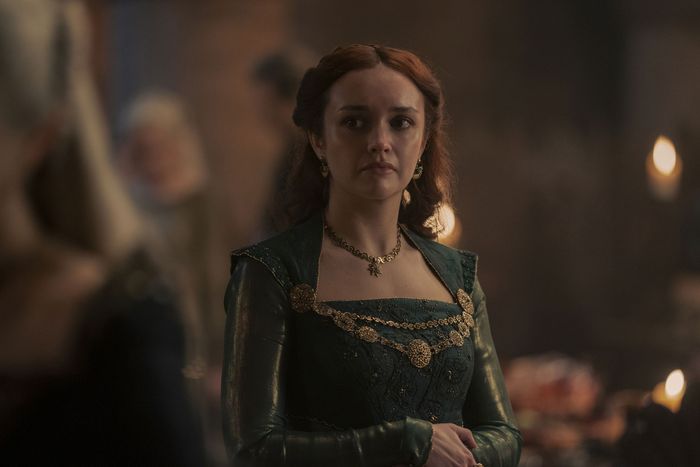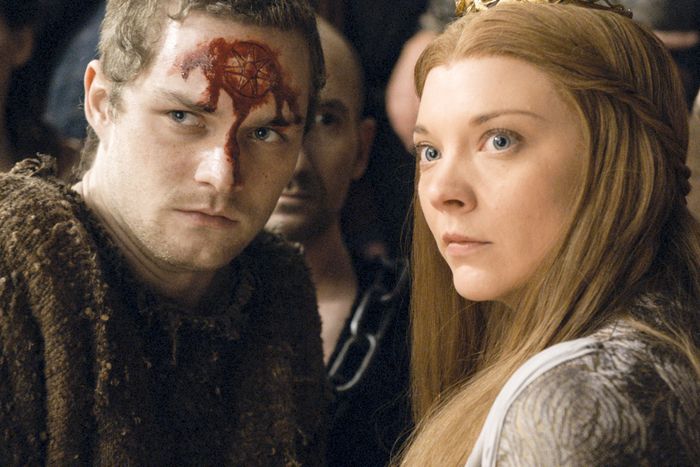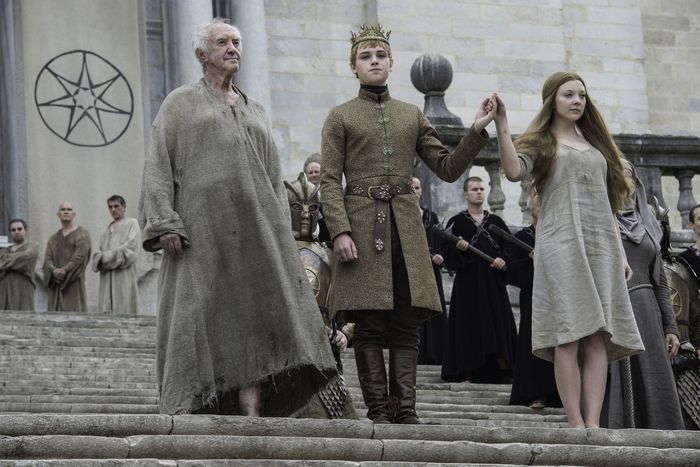
House of the Dragon has had no shortage of drama. Generational vendettas, carnivorous crabbies (remember Craghas Drahar?), assassinations and dragon-egg abductions, sexual scandals and faked deaths. Amid all that power-grabbing and chaos-festering, why not add religious tension into the mix? It’s obvious that war is coming, and while the season’s eighth episode, “The Lord of the Tides,” throws all kinds of fuel into the fire between the Targaryens and the Hightowers, the presence of the seven-pointed star is a particularly intriguing wrinkle.
In the first half of its first season, religion hadn’t really been central to House of the Dragon. The Seven Kingdoms is made up of an array of orders and occupations, and figures like knights, guards, maesters, lords, Small Council bureaucrats, and sex workers have all factored in to varying degrees of importance. The focus in these characterizations has been less what people believe, and more what they do, either for specific houses or the general realm: the healers who treat King Viserys’s rotting affliction, the spies who report to Mysaria, the sworn protectors who make up the Kingsguard, the soldiers who fought in the Stepstones.
House of the Dragon pivoted, though, with “Driftmark,” which gave us a religious ceremony in the form of Rhaenyra and Daemon’s wedding, overseen by a Valyrian priest and complete with a blood-swapping component that would make Megan Fox and Machine Gun Kelly proud. For viewers of Game of Thrones, this ritual stands out for its otherness. It’s more intimate and less stuffy than the multiple cloak-swapping ceremonies Sansa suffered through, and it’s a Targaryen marrying a Targaryen, the only incest begrudgingly allowed in Westeros. (How else will this family maintain its lovely silver hair?)
But what matters most, perhaps, is what this Targaryen ceremony lacks: no septons, no seven-pointed star, and no indication of the New Gods. Just like the Starks’ older servants and the Free Folk who resisted the Faith of the Seven and maintained their belief in the Old Gods of the Forest in Game of Thrones, seemingly so too did the Targaryens of 200 years prior refuse to give into the Father, Smith, Warrior, Mother, Maiden, Crone, and Stranger, and instead followed their own religion. Rhaenyra and Daemon getting married is an act of exceptionalism and of defiance — a reification of their status as rarified Targaryens who don’t have to abide by other people’s laws, sacred or otherwise. They have their own way of doing things, and if anyone stands against them, well, that’s what house words “fire and blood” are for.
“Driftmark” provides essential, oppositional context to “The Lord of the Tides,” which sees Daemon, Rhaenyra, and their children travel to King’s Landing to petition for Lucerys to inherit the Driftwood Throne through his (presumed) father Laenor. Rhaenyra and Daemon may be the named successor to the Iron Throne and the king’s younger brother, respectively, but they arrive in the Red Keep with little fanfare. Queen Alicent and her father, Otto the Hand, want to present a veneer of disinterest and dismissal to Viserys’s other family as a way to emphasize their own power running the kingdom while Viserys slowly, agonizingly dies. It’s an additional slap in the face that in the six years Rhaenyra and Daemon have been gone from court and the Hightowers have consolidated influence, the greens loyal to Alicent have stripped King’s Landing of visual reminders that the Targaryens are the ruling family, and loaded up on symbols of the Faith of the Seven instead. Whatever the King’s Landing version of Hobby Lobby is, they are eating good off that government contract!
This embrace of the New Gods by Alicent serves a dual purpose. Outwardly, it softens Alicent as she sits on the throne in her husband’s stead, making her seem like a woman of faith, morality, and charity — and someone strong enough to back up those convictions with force. Consider her outfits this episode: still green, but now with two seven-pointed-star pendants, chunky gold chains across her dresses that evoke armor, and extended shoulders that look like epaulets. Alicent wants to project this pious, virtuous, and courageous image both to the nobles who saw her slice Rhaenyra’s arm with a dagger years ago at the PTA meeting from hell, and to the commoners she has to pay off when her son Aegon rapes them. Taken with the abundance of re-emphasized seven-pointed-star flourishes in the palace — like the window overlooking the Small Council meetings, first seen in premiere episode “The Heirs of the Dragon,” when Viserys sat the throne — this is all branding and image management on Alicent’s part. “I would say it’s nice to be home, but I scarcely recognize it,” Rhaenyra murmurs, as Daemon displays titchy irritation at the “removal of Targaryen heraldry and the installation in its stead of various statues and stars.” This is exactly what Alicent wants: for the Red Keep to no longer feel welcome to the Targaryens.
Alicent’s use of religion as another tool in the upcoming war between the greens and the blacks is a change from George R.R. Martin’s in-world history book Fire & Blood, on which House of the Dragon is based. After King Jaehaerys I made peace with the Faith of the Seven organizational structure and the Faith Militant military order was disbanded, religion mostly stayed in the background during the Dance of the Dragons. The realm was at peace under Jaehaerys and Viserys, and although septons are present, they and their religion are only sporadically mentioned in the story. The book’s recounting of the past is partially pulled from the firsthand account of Septon Eustace, “who served in the royal sept in the Red Keep during much of this time, and later rose to the ranks of the Most Devout … a confidant and confessor to King Viserys and his queens,” but the septon is an observer, not a participant. He recorded “the secrets of bedchamber and brothel in hushed, condemnatory tones,” Martin writes, but that was about it.
The question raised by the religious emphasis in this episode becomes, then, how much Alicent has bought her own narrative, and daddy Otto’s justification that “What we do, we do for the good of the realm.” We’ve seen how Alicent is convinced of her own victimization, how she believes she deserves power in exchange for her years of “duty” and “sacrifice,” as she spat at Rhaenyra in “Driftmark,” and how that certainly has turned her into a hypocrite who prays before meals (to Daemon’s hilarious disgust) while also forcing moon tea upon servant-girls so they don’t complicate the line of succession with bastards. But whether she genuinely believes that she is special for her faithfulness is an outstanding question that will surely be complicated by Viserys’s confused mutterings to her about Aegon’s dream prophecy, and his instruction that “you are the one” who must “unite the realm against the cold and the dark.” Viserys, when he was more clear-minded, believed that dream was meant for Rhaenyra. Now that Alicent believes that prophecy is about her son Prince Aegon, though, what will she be willing to do to get him on the throne?
Don’t forget: The last time we watched the realm go gaga for zealous devotion to the Faith of the Seven, it ended badly for nearly everyone involved. Remember these people? They all ended up dead!


Wildfire, dragonfire — all they do is burn. And despite Alicent’s best efforts, the seven-pointed star might not be fireproof.





